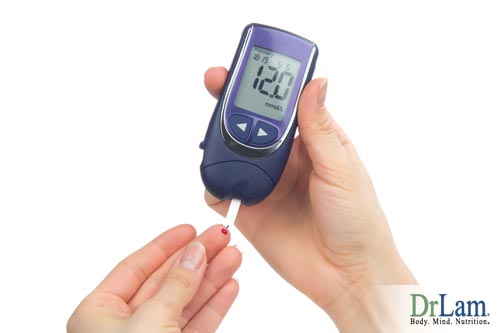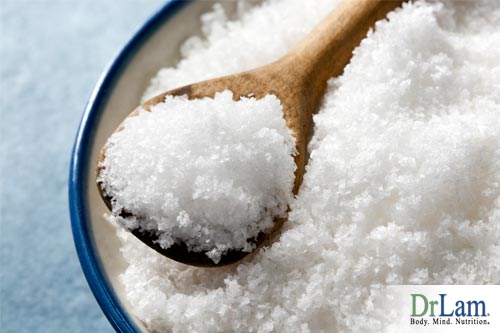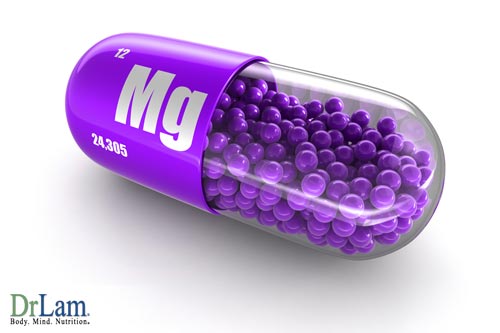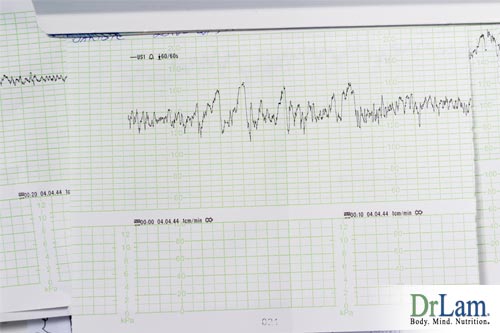 Adrenal fatigue, caused by various physiological and/or psychological stress factors, affects the adrenal glands’ production of cortisol. Looking at this scenario, one might think that cortisol supplements are the answer. If the body has a shortage in a certain hormone, like cortisol, conventional medicine simply employs a medication to increase the body’s stores. Would that solve the problem?
Adrenal fatigue, caused by various physiological and/or psychological stress factors, affects the adrenal glands’ production of cortisol. Looking at this scenario, one might think that cortisol supplements are the answer. If the body has a shortage in a certain hormone, like cortisol, conventional medicine simply employs a medication to increase the body’s stores. Would that solve the problem?
But what if the problem was not a shortage, but the exact opposite? What if there was too much cortisol? Would popping a pill simply lower the hormonal level?
The answer is complex, because a dysfunction in the body has a domino effect, impacting other functions as well.
Cortisol, often referred to as the body’s primary ‘stress hormone’, is manufactured in the adrenal glands. It plays a significant role in managing any stressful situation the body may experience, but it is more than that. It actually helps balance hormones. Cortisol secretion is controlled by the hypothalamic-pituitary-adrenal (HPA) axis.
The majority of cells in the body have cortisol receptors, allowing cortisol to influence their functionality in one way or the other. Because cortisol helps keep the body in a state of life-sustaining balance, it is often referred to as the ‘alpha hormone’. Its three main functions are regulating inflammation in the body, increasing blood pressure, and raising blood sugar levels. Additionally, it supports a fetus during pregnancy, and helps control the salt and water balance in the body.
A few of the life-sustaining processes modulated by cortisol are:
Normally, your cortisol production is higher in the morning. This higher level gives you a feeling of alertness. You are ready to conquer the world and able to face all the challenges the day presents. Your cortisol production then tends to taper off as the day goes by, until, at bedtime, it is superseded by the production of melatonin. Melatonin gives you a feeling of restfulness and ensures a good night’s sleep.
When under stress, however, whether physiological or psychological, a different scenario occurs. The HPA axis works to control the situation. It takes charge. The hypothalamus in the brain, when perceiving stress, sends a signal to the master endocrine gland, namely, the pituitary gland. The pituitary gland secretes the hormone ACTH, which in turn signals the adrenal glands to produce more cortisol. At the same time, the adrenals produce other hormones such as adrenaline to prepare the body for ‘fight or flight’ mode, a natural reaction to any perceived ‘dangerous’ situation.
 Cortisol’s function now comes into play. Glucose levels go up so that your muscles have the energy they need to either run or fight. Blood pressure increases, increasing oxygen levels to the brain, so that you can think clearly while engaged in the stressful situation.
Cortisol’s function now comes into play. Glucose levels go up so that your muscles have the energy they need to either run or fight. Blood pressure increases, increasing oxygen levels to the brain, so that you can think clearly while engaged in the stressful situation.
At the same time, those functions that are less necessary for immediate survival are suppressed. These include your immune system, libido, and digestive system. The focus is only on the bodily functions necessary for survival. Although the increase in certain functions and the decrease in others works positively for immediate survival, there are also negative consequences. This is especially true if high cortisol levels persist over a prolonged period.
Once the stressful situation is over, the hypothalamus stops the alarm, and all functions return back to their normal state. However, in prolonged stressful situations, this doesn’t always occur properly. Constant stress, or even increased stress levels, has a negative effect on the body’s normal cortisol production.
As the body goes through the initial stages of adrenal fatigue, the first call of duty is to produce more cortisol to enable it to cope. However, if the problem persists, the symptoms associated with adrenal fatigue increase in both number and severity. These symptoms include brain fog, heart palpitations, anxiety, panic attacks, low libido, food sensitivities, and even a hypersensitivity to cortisol supplements and medications.
The body responds to the adrenal glands being unable to produce sufficient cortisol by finding other avenues for producing the needed hormones. These include body organs and glands.
Once the body gets to the fourth and last stage of adrenal gland fatigue, however, the body’s systems start shutting down. Symptoms associated with this stage include memory loss, weight gain, worsening skin conditions, digestive problems, depression, heart disease, and sleeping problems. Once this stage is reached, the path to recovery is a long and laborious one.
Too much cortisol, just like too little, has a negative impact on the body.
Traditionally, low cortisol levels are managed by means of supplementation. This is usually with synthetic cortisol called prednisone or natural cortisol called hydrocortisone. These cortisol supplements are usually taken orally.
However, these cortisol supplements have their own dangers.
Those on cortisol supplements must track their cortisol levels. The aim is to emulate the natural cortisol progression throughout the day, and supplements need to be adjusted accordingly. Under normal conditions, cortisol concentrations are higher in the mornings than the evenings, and supplementation is geared towards achieving the same effect.
Cortisol supplements however, should only be considered when there are few alternatives left, for example, in cases of tuberculosis or Addison’s disease. Western medicine also uses them for psoriasis, certain cancers, and inflammation. This is because synthetic cortisol supplements, when administered over a long period, have a negative effect on the body’s own cortisol production.
The negative side effects of cortisol supplements include:
 Rather than summarily using cortisol supplements, there is a natural approach to addressing lower cortisol levels in the body. This approach is holistic, seeking the root cause of the problem and changing certain aspects of lifestyle and diet to help the adrenals put out more cortisol on their own. That way, the body’s regulatory feedback loops remain intact. These changes are introduced over a period of time, and typically include changing eating habits, dealing with stressors, examining exercise routines, and using non-cortisol supplements that aid in the body’s natural production and regulation of cortisol.
Rather than summarily using cortisol supplements, there is a natural approach to addressing lower cortisol levels in the body. This approach is holistic, seeking the root cause of the problem and changing certain aspects of lifestyle and diet to help the adrenals put out more cortisol on their own. That way, the body’s regulatory feedback loops remain intact. These changes are introduced over a period of time, and typically include changing eating habits, dealing with stressors, examining exercise routines, and using non-cortisol supplements that aid in the body’s natural production and regulation of cortisol.
Constant synthetic cortisol supplements, as utilized by western medicine, could ultimately lead to high levels of cortisol in the body and their associated effects. Consistently elevated cortisol levels have a devastating effect on the body.
Adrenal fatigue is one condition that may be caused by elevated cortisol levels due to stress. Many negative symptoms normally associated with adrenal fatigue are caused by consistently elevated cortisol levels.
Cortisol is necessary for the body to cope in stressful situations, but consistently high levels of this hormone have a devastating impact on the body over the long term. It slows down cell regeneration and the healing process, destroys healthy bone and muscle tissue, monopolizes chemicals the body needs to produce other hormones vital to the body’s function, and weakens the immune system. In other words, too much of something needed to preserve life ends up destroying it.
Cushing’s syndrome is an illness associated with consistently high cortisol levels. It is either the result of the body continuously producing too much cortisol, or due to the long-term use of cortisol supplements.
The general symptoms that are typically associated with constantly elevated cortisol levels include:
If you suffer from a few of these symptoms, it is a good idea to have your cortisol levels tested by your doctor. These tests should be done after a period of fasting, so early morning, twenty minutes after waking up, is usually the best time to do so. This is because your cortisol levels are at their highest at this time. The 24-hour cortisol test is an even better option, as it supplies information on your cortisol levels for the duration of an entire day. Most practitioners of natural medicine can do this test for you.
Although it is normal for cortisol levels to fluctuate during the day, there are a number of reasons why levels may be consistently high. These include:

Functional medicine’s aim is to restore the balance in the body without using the drugs commonly called for by western medicine. To this end, the body is looked at as an entire organism consisting of different parts. What happens in one part of the body impacts the whole body, resulting in different symptoms. Instead of addressing each symptom separately, the aim is to find and remedy the reason for these symptoms, using as natural a method as possible, in order to bring the body back to optimal health.
When cortisol levels are high, instead of using drugs to reduce levels, a more physiologically friendly approach is adopted using natural cortisol supplements and other means.
Eight hours should be what you are aiming at. High cortisol levels in the blood make sleeping difficult, so you should always try to get yourself in the mood. Watch a relaxing movie or read a book.
Improper breathing methods whereby breathing is shallower, especially due to bad posture, has a compromising effect on oxygen flow to the brain and other organs while stimulating the release of cortisol and adrenaline.
It inhibits excessive secretion of cortisol. At the same time, excessive cortisol actually depletes your vitamin B reserves. Vitamin B could also be taken as a supplement. Liver is an excellent source of this vitamin.
Fish oil is high in Omega 3 fatty acids which lower cortisol production due to mental stress, while the vitamin K2 content plays a role in replenishing hormone stores in the body.
Non-strenuous exercise, such as different forms of dancing, walking, or yoga, reduces cortisol levels. Do not over-exert yourself, however, as this leads to the production of adrenalin and more cortisol.
Blue light radiates from your cell phone, computer screen, and even your television set. It has the effect of raising cortisol levels. Exposure to these should be limited as much as possible. If exposed to blue light constantly, consider blue-light blocking glasses that limit the concentrations that you are exposed to.
One mug of coffee has the potential of increasing your cortisol levels by thirty percent in a one hour period! Furthermore, it keeps up this effect for eighteen hours. This is why coffee is the favorite of so many writers – it keeps them awake and functioning.
As to alcohol, research showed a high correlation in men and women with regards to alcohol intake and higher cortisol levels in the body. The chronic intake of alcohol stimulates the HPA axis and results in overproduction of cortisol.
Reflexology has a relaxing effect on the body. It follows that the cortisol production is lessened.
Certain herbs and their derivatives, as well as food, lower cortisol levels naturally. Examples to consider are garlic, oranges, chamomile tea, berries, black tea, rhodiola, basil, and ashwagandha.
 Although too much salt is never advised, sea salt is a natural way of reducing cortisol in the body. Research has found that salt loading in patients with high cortisol levels has the effect of reducing the amount of cortisol in the patient’s body.
Although too much salt is never advised, sea salt is a natural way of reducing cortisol in the body. Research has found that salt loading in patients with high cortisol levels has the effect of reducing the amount of cortisol in the patient’s body.
Studies show that when vitamin C supplements were given to participants, their cortisol levels lowered along with their stress levels as opposed to the control group. Incidences of high blood pressure were also lower in this group.
Earlier studies conducted on lab rats indicated that when rats were submitted to stress and given vitamin C supplements, they did not respond to either psychological or physiological stress in the normal way, nor was there an increase in their normal cortisol levels. The control group, on the other hand, which was subjected to exactly the same stressors without the supplements, had up to three times more cortisol in their bodies.
Zinc supplements, according to research, play an inhibiting role in cortisol secretion in humans. The research was conducted on two groups, where one group was given oral zinc supplements while those in the control group were given an intravenous saline infusion. Of the two groups who took part in the research, a significant reduction of cortisol was noticed in the experiment group, while the control group saw no significant effect on their cortisol levels.
Studies show that both of these cortisol supplements play a major role in reducing cortisol levels in the body. Both merit an in-depth investigation into what they are and how to best use them to address high cortisol levels. They will be considered in detail in the following sections.
Note: When considering cortisol supplements, bear in mind that the body’s response varies from person to person and at each stage of adrenal fatigue. What works for one person may not work for another, and may in fact worsen the symptoms of some. Simply taking cortisol supplements without careful consideration of the clinical picture is a common recovery mistake.
Phosphatidylserine supplements have, to a large extent, become the go-to supplement when balancing high cortisol levels in the body. Your body produces this chemical, but it’s ability to do so is mostly dependent on the food you eat as a source. Although these supplements used to be made from cow brains, they are now more commonly manufactured from cabbage and soy.
Pronounced “faws-fa-tidal-serene”, phosphatidylserine is a negatively charged aminophospholipid supplement that promotes brain function while actively suppressing the production of cortisol.
A phospholipid present in all cell membranes within the body, phosphatidylserine plays a role in many bodily functions. One of its vital roles is cellular communication, as well as intracellular transfer.
During times of stress, the body’s automatic stress response is activated. Through this response, the HPA axis works towards works towards protecting the body against any given threat, releasing vast quantities of cortisol.
 Studies have found that phosphatidylserine blunts elevated cortisol levels, and thus their effects, during stressful periods. It also serves to improve one’s mood during this time. Because less cortisol is released while mood is improved, the phospholipid also plays a role in supporting healthy blood pressure levels.
Studies have found that phosphatidylserine blunts elevated cortisol levels, and thus their effects, during stressful periods. It also serves to improve one’s mood during this time. Because less cortisol is released while mood is improved, the phospholipid also plays a role in supporting healthy blood pressure levels.
In addition to having a calming effect, blunting cortisol production, and maintaining healthy blood pressure, it also plays a role in negating other side effects typically associated with adrenal fatigue. These include alleviating insomnia, promoting better sleep, and supporting weight loss (usually associated with a buildup of cortisol).
Research also indicates that phosphatidylserine is effective in negating the effects of exercise-induced stress. Besides of its effectiveness as a cortisol blocker, it also helps prevent the physiological damage which is common due to too much exercise.
Additionally, phosphatidylserine contains choline. Choline is the precursor of acetylcholine, which is tied to certain brain functions such as mental focus and memory. This compound has been used for patients with Alzheimer’s, and in many instances researchers have seen an improvement, although the effect seems to wear off after a period.
In short, phosphatidylserine, has an inhibiting effect on cortisol production and significantly speeds up recovery after strenuous exercise. It improves general well-being, prevents soreness in muscles, and enhances an athlete’s performance. It also works to maintain calm mood and boosts focus and memory.
Phosphatidylserine levels are quickly depleted due to their cortisol inhibiting function, however, so supplements are sometimes necessary in order to raise their levels in the body.
Phosphatidylserine supplements are of benefit in many areas, in addition to those mentioned above. Phosphatidylserine:
Although no side effects have been reported, as with all cortisol supplements, there are a few possibilities. These are as follows:
Phosphatidylserine supplements should ideally be taken under the supervision of a healthcare practitioner. Different forms are available, depending on the specific clinical application.
Our bodies are designed to obtain magnesium from the food we eat. However, the modern diet that many of us eat is poor in magnesium. Foods such as green, leafy vegetables, nuts, seeds, and whole grains are rich in magnesium, and were once part of our staple diet. These days, however, they are often replaced by processed foods that contain little to no magnesium.
 Another consideration is the soil. Modern farming practices and man-made fertilizers have depleted soil’s nutrients. This means that any food that is not grown organically has substantially fewer of these nutrients than what our grandparents and great-grandparents used to get.
Another consideration is the soil. Modern farming practices and man-made fertilizers have depleted soil’s nutrients. This means that any food that is not grown organically has substantially fewer of these nutrients than what our grandparents and great-grandparents used to get.
A comparison of studies in food nutrient quality between 1950 and 1999 suggested that crops cultivated to grow more rapidly and have a higher yield have a drastically decreased nutrient value. The same results were found in studies conducted in other countries. This means that even foods once high in magnesium are drawing less of the nutrient from the soil.
Magnesium should be the most abundant element in your body. It serves a multitude functions at the molecular level.
It is found in several different forms. These include magnesite (a rock salt commonly called magnesium carbonate), magnesium chloride (in seawater), and in chlorophyll of plant matter. The most easily absorbed of these is magnesium chloride. This is because it easily dissolves in water and is thus quickly absorbed by the body.
As it is a macro-nutrient, the body needs vast quantities of this mineral in order to function correctly.
Magnesium plays an important role in maintaining mineral balance in the body. It helps maintain sodium, calcium, and potassium, which affect nerve impulses, the heart’s rhythm, and muscle contraction.
Minerals need to be in balance to ensure good health. Magnesium is the great equalizer, because when there is too little magnesium, the balance goes awry, and cells no longer function optimally.
Magnesium has a metabolizing function in your cell’s mitochondria. Mitochondria supply the energy a cell needs to produce adenosine triphosphate (ATP). It does this by converting amino acids, glucose, and fatty acids. When there is a magnesium shortage, however, this function cannot readily take place. In essence, ATP and magnesium are dependent on each other, as they have an effect on your muscles, nerve transmission, and the calcification of blood vessels and tissue.
In addition, magnesium has psychological significance as well. Research indicates that a lack of magnesium is associated with conditions such as headaches, seizures, muscle cramps, irritability, depression, psychosis, and behavioral disturbances. These are also typical symptoms that relate to the different stages of adrenal fatigue.
Magnesium plays a vital role in hormone production and regulation, and helps to improve and maintain proper function in many other bodily systems. These benefits include:
Magnesium plays a role in activating vitamin D. If you have a magnesium shortage, vitamin D is unable to fulfill its role as the precursor of the hormone calcitriol. Calcitriol is a steroid hormone that regulates the calcium in your blood and optimizes kidney functionality.
Magnesium is involved in glycolysis and the Krebs cycle. Glands such as the testes and thyroid and ovaries require much energy, and therefore magnesium, to function correctly.
The presence of magnesium is essential for the formation of the thyroid hormone. Its anti-inflammatory properties help reduce the autoimmune inflammation underlying most instances of thyroid problems.
 Magnesium is necessary for the manufacturing of certain steroid hormones such as testosterone, estrogen, and progesterone. Hot flashes experienced by premenopausal women are significantly reduced by means of magnesium supplementation.
Magnesium is necessary for the manufacturing of certain steroid hormones such as testosterone, estrogen, and progesterone. Hot flashes experienced by premenopausal women are significantly reduced by means of magnesium supplementation.
Cells replicate in order to sustain life. Yet, as you age, they start losing this ability. A study comparing different cultures with different magnesium intakes has shown that in those with higher magnesium levels, their cell replication continues until a much later stage than in those countries with lower magnesium levels. The end result is a longer lifespan and a healthier overall population.
Magnesium sensitizes insulin receptors. This means you feel more satisfied with the sugars already in your diet and have fewer cravings for sugary foods, something which is important in weight loss. It also helps with the prevention of osteoporosis in the elderly.
Magnesium promotes a good night rest, which is important for the production of anabolic hormones, e.g. the growth hormone and dehydroepiandrosterone (DHEA). Growth hormones are essential for healthy muscles, while DHEA, made in the adrenal glands, can be converted into other hormones when the body needs them.
Magnesium has a calming effect on the nervous system. When the nervous system is calm, less cortisol is produced. The HPA axis is your stress hormonal system. When it is properly regulated, the other hormonal axes are also able to function to a more optimal degree.
Because the major portion of the magnesium in your body is inside your cells, there is no way of testing if you are magnesium deficient with a routine blood test. Intracellular red blood cell magnesium provides the best form of measuring magnesium level. This test is seldom done, both because it is expensive and because the majority of people living in the modern world are deficient.
Indications of a magnesium deficiency include:
You do not have to have all these health problems in order to have a deficiency, but if you find yourself nodding at a number of them, it is a good idea to consider a magnesium supplement. This is especially true because a deficiency in this mineral is also an indicator of an elevated cortisol level.
Research indicates that in the USA alone, approximately three-quarters of the population suffer from a magnesium deficiency. Incidents of chronic disease are on the rise. Research has proven a link between magnesium and over 300 different biochemical reactions in the human body. With the importance of magnesium clear, it is valuable to consider different ways of increasing magnesium levels in the body.
Oral magnesium supplements do not work well to control cortisol levels for everybody. Some forms of magnesium have even been shown to have an absorption rate of only four percent.
However, magnesium absorption through the skin is extremely effective.
 A bath or footbath with magnesium chloride crystals allows magnesium to enter the body through the skin. Because it is delivered to the body via the skin, it is easily tolerated and assimilated by most people, especially in the muscular system where magnesium is needed for it to function optimally. Note that those in advanced stages of adrenal fatigue may not be able to tolerate such modality.
A bath or footbath with magnesium chloride crystals allows magnesium to enter the body through the skin. Because it is delivered to the body via the skin, it is easily tolerated and assimilated by most people, especially in the muscular system where magnesium is needed for it to function optimally. Note that those in advanced stages of adrenal fatigue may not be able to tolerate such modality.
Magnesium oil is readily absorbed through the skin and is convenient to use. Some people, however, find that it tends to dry out their skin. If you fall into this category, try taking a shower after about half an hour of spraying to get rid of any excess. Those with advanced AFS also tend to develop paradoxical reactions and have difficulty tolerating this form of magnesium.
Magnesium lotion or butter is applied topically. Due to the other ingredients in this form, the skin is not dried out. Again, it may not be well tolerated by those in advanced stages of AFS.
Sea water is a rich source of magnesium. A daily swim in the sea will help improve your levels of this mineral.
Internally, magnesium is absorbed through the intestinal tract. This includes the mouth, esophagus, stomach, small intestine, and large intestine.
Of the magnesium taken orally, 40% is absorbed by the small intestine, 5% by the large intestine, and the rest, a staggering 55%, leaves the body as waste. Some people are only able to absorb 20% of the total oral supplements consumed, while certain supplements, such as magnesium oxide, only have an absorption rate of 4%. This makes oral supplementation a poor option for many.
As far as diet goes, however, there are a number of ways to obtain more magnesium naturally. It is important to note that certain foods actively contribute towards magnesium absorption, while others hinder the process.
When eating food high in magnesium, the absorption rate of magnesium is also higher.
Certain medications and health problems are negatively affected by magnesium supplements. These medications include those taken for heartburn, blood pressure, and for psychiatric problems.
People with shortened bowels due to surgery may find they have diarrhea when taking oral supplements. In these instances, a topical application applied to the skin is better.
People with kidney problems, bradycardia, bowel obstructions, and myasthenia gravis should avoid magnesium cortisol supplements.
 It is possible to have too much magnesium, although it is a rare occurrence. The body’s internal method of getting rid of excessive magnesium is by initiating diarrhea. Once the body’s tolerance level is reached, a harmless diarrhea will ensue. Simply reduce magnesium and this should resolve spontaneously.
It is possible to have too much magnesium, although it is a rare occurrence. The body’s internal method of getting rid of excessive magnesium is by initiating diarrhea. Once the body’s tolerance level is reached, a harmless diarrhea will ensue. Simply reduce magnesium and this should resolve spontaneously.
Consistent excessive magnesium can lead to what what is known as hypermagnesemia. This can occur in those suffering from chronic health conditions. Indications of a magnesium overload include an irregular heartbeat, retention of urine, respiratory problems, cardiac arrest, nausea, vomiting, muscle weakness, and general lethargy.
Your body needs cortisol, and at times, it needs higher than normal levels of the hormone in order to survive a stressful situation. Sometimes, the body makes too much cortisol due to the HPA axis being constantly on the alert. The long-term effects are debilitating.
Cortisol, as with all other hormones in the body, needs to be in a state of balance in order for your all your body’s systems to function at their optimal level. When this is not the case, however, the adrenal glands are consistently forced to put out ever increasing amounts of this hormone, and all systems are impacted.
Phosphatidylserine and magnesium cortisol supplements are two important alternatives for lowering these cortisol levels. Any kind of oral cortisol supplements, however, need to be taken according to a certain dosage in order to avoid negative side-effects. It is important, therefore, that where adrenal fatigue and supplementation are considered, you choose the best course of action for your body with the guidance of a qualified practitioner.